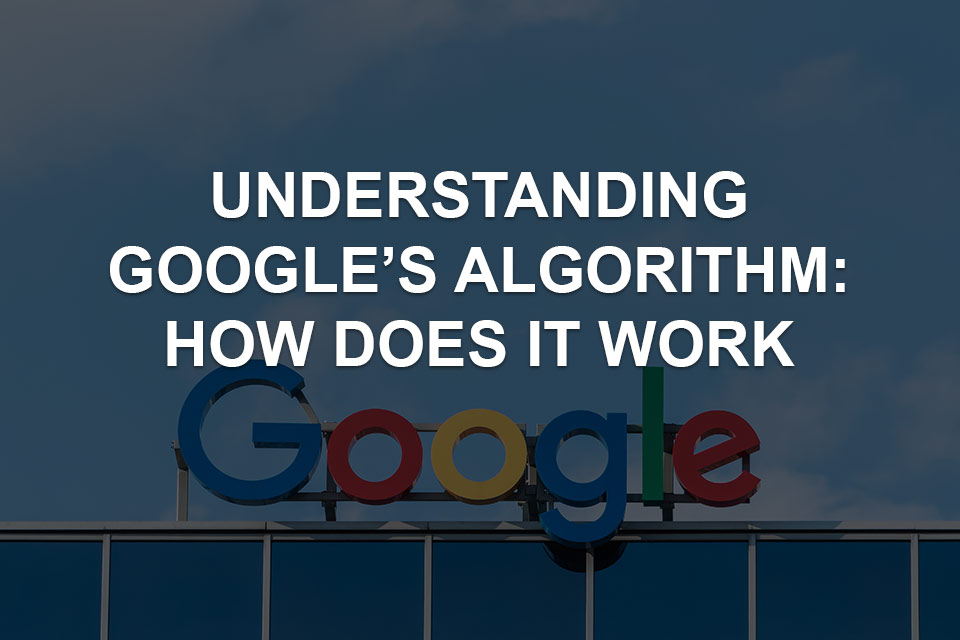Understanding Google’s Algorithm: How Does It Work?

Google’s algorithm, the heart of the search engine, remains an enigma to many. Demystifying the algorithm Google is an essential key to mastering the art of online visibility and achieving top search results. For those who want to take a closer look at the inner workings of the Google search algorithm, its complex mechanisms, and the factors that determine search rankings, this content will serve as a guide. From crawling and indexing to ranking and penalties, join us on this useful journey of digital discovery to understand the driving force behind Google’s search engine and gain an edge in the digital landscape.
What is Google Algorithm?
The complex and sophisticated system that determines the ranking of web pages on search engine results pages (SERP) is called the algorithm Google. The algorithm is constantly evolving and adapting to provide users with the most relevant and high-quality content. In essence, it analyses numerous factors such as keywords, website authority, user experience, and relevance to deliver the best possible search results.
Google algorithm for SEO works in multiple stages where Google’s bots discover and crawl web pages on the internet. After a page is crawled, it is indexed, i.e. stored in Google’s huge database. In the ranking phase, the algorithm evaluates various factors to determine in which order the indexed pages will appear in search results. These factors include the relevance of the content to the search query, the quality and quantity of the backlink, the loading speed of the website, mobile compatibility, and others. By optimizing your website based on these factors, you can increase your chances of ranking higher in the SERP and attract a wider audience to your site.
How Does Google Algorithm Work? What is its Purpose?
Google, the world’s leading search engine, processes billions of search queries each day. Ever wondered how it manages to deliver relevant and accurate results within seconds? The answer lies in the Google search algorithm, a complex system that determines the ranking of web pages in the search engine results pages (SERP).
Crawling and Indexing
The first step in understanding how Google’s algorithm works is to explore its process of crawling and indexing. Google deploys automated software known as “web crawlers” or “spiders” that scour the internet, following links from one page to another. These crawlers collect data and information from web pages, creating an index of the vast amount of content they encounter. This index acts as a massive library of web pages that Google can access and retrieve when users perform a search.
Ranking Factors
Once a page is indexed, Google’s algorithm analyzes numerous ranking factors to determine its position in the search results. While the Google ranking algorithm is a closely guarded secret, we know that it considers factors such as relevance, authority, and user experience. Relevance refers to how well the content matches the user’s search query, while authority is measured by the quality and quantity of backlinks pointing to a page.
Updates and Refinements
Google’s algorithm is not a static entity; it undergoes regular updates and refinements to improve the search experience. Google algorithm changes and updates, such as the famous “Panda” and “Penguin” updates, aim to combat spammy and low-quality content while rewarding websites that provide valuable information. Keeping up with these Google algorithm updates and understanding their impact on search rankings is crucial for website owners and digital marketers.
The Purpose of Google’s Algorithm
The ultimate purpose of Google’s algorithm is to provide users with the most relevant, accurate, and high-quality search results. Google’s mission is to organize the world’s information and make it universally accessible and useful. Google search algorithm‘s purpose is to reward websites that provide valuable content, user-friendly experiences, and adhere to ethical SEO practices, while also penalizing those that engage in manipulative tactics.
What are the Most Important Google Algorithm Types?
Google’s search algorithm is a complex system that determines the ranking of web pages in search results. Various Google algorithm updates have been introduced over the years to improve the search experience and combat spamming practices. As a website owner or digital marketer, understanding the different Google algorithms is crucial to optimizing your online presence.
Mum
Google’s Mum (Multitask Unified Model) algorithm, introduced in 2021, represents a significant step forward in understanding and processing complex search queries. Google latest algorithm Mum leverages advanced machine learning techniques to comprehend the context and intent behind conversational queries. It considers multiple aspects of a query, such as a user’s search history and recent interactions, to provide more relevant and personalized search results.
Penguin
Introduced in 2012, the Penguin algorithm Google primarily targets spammy link-building practices. It aims to identify websites that engage in manipulative tactics to artificially boost their search rankings. Penguin analyzes factors such as the quality of backlinks, anchor text diversity, and the relevance of linking websites.
Panda
Launched in 2011, Google’s algorithm Panda focuses on content quality. Its primary objective is to reward websites that provide valuable, original, and relevant content while penalizing those with thin, duplicate, or low-quality content. Panda evaluates factors such as keyword stuffing, content duplicity, and user engagement metrics to determine the overall quality of a website.
PageRank
One of the most fundamental algorithms in Google’s arsenal is the PageRank algorithm, developed by Google founders Larry Page and Sergey Brin in 1998. Google PageRank algorithm assigns a numerical value to web pages based on the quantity and quality of backlinks they receive. The algorithm treats a link from one page to another as a vote of confidence or recommendation. The more high-quality and relevant backlinks a page receives, the higher its PageRank score and the better its chances of ranking well in search results
To stay one step ahead in the ever-changing digital landscape, it’s crucial to stay informed about the latest Google algorithm update. By understanding the Google algorithm update history, you can adapt your SEO strategies and ensure that your website remains optimized for success. Stay proactive by following reputable industry blogs, participating in relevant forums, and implementing best practices recommended by Google. Embrace the evolving nature of the Google algorithm and leverage it to improve your digital presence.
FAQs
How many algorithms does Google use?
Google uses hundreds of algorithms to power its search engine and deliver relevant search results. Some of the most well-known algorithms include Google PageRank algorithm, Mum, Bert, Penguin, and Hummingbird, each serving a specific purpose such as evaluating content quality, combating spammy practices, understanding user intent, and determining the relevance of web pages.
What are the top 5 Google algorithm update?
Five important Google algorithm updates that have had extremely beneficial effects include Panda, Penguin, Mum, Bert, and PageRank. Focusing on the quality of content, improving the mobile browsing experience, processing and interpreting ambiguous queries, and combating manipulative link-building practices, these updates aim to deliver valuable search results.
How often does Google change their algorithm?
Although the exact frequency of algorithm updates is not certain, we can say that Google makes changes regularly. It is estimated that Google makes hundreds of algorithm updates each year, although most are minor changes. These Google algorithm changes can range from minor adjustments to certain ranking factors to major updates that can significantly impact search results.



0 Comments